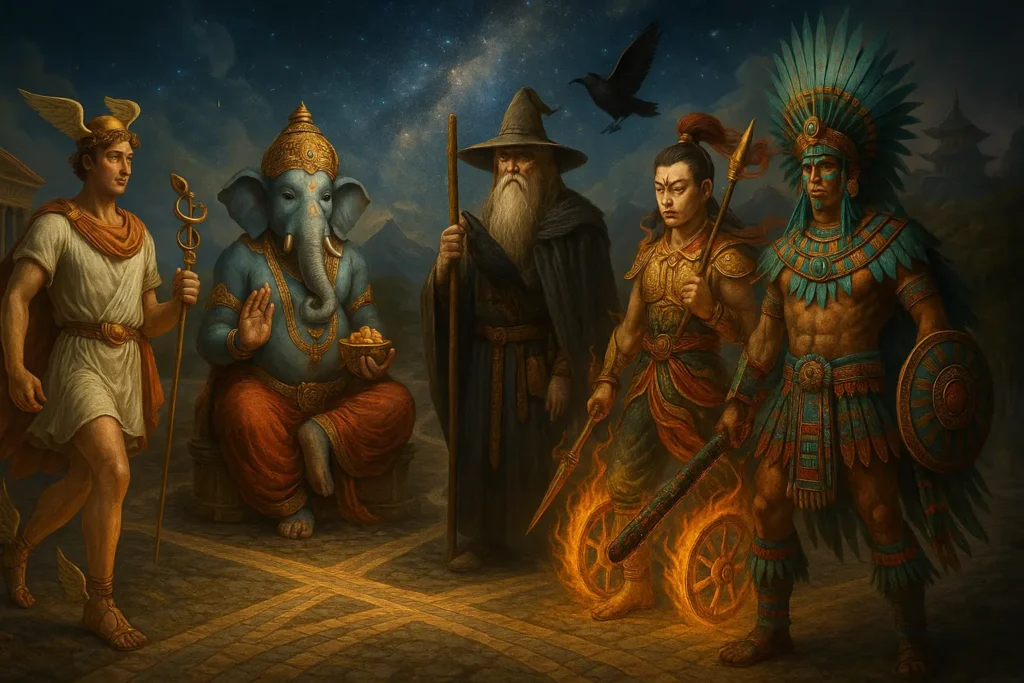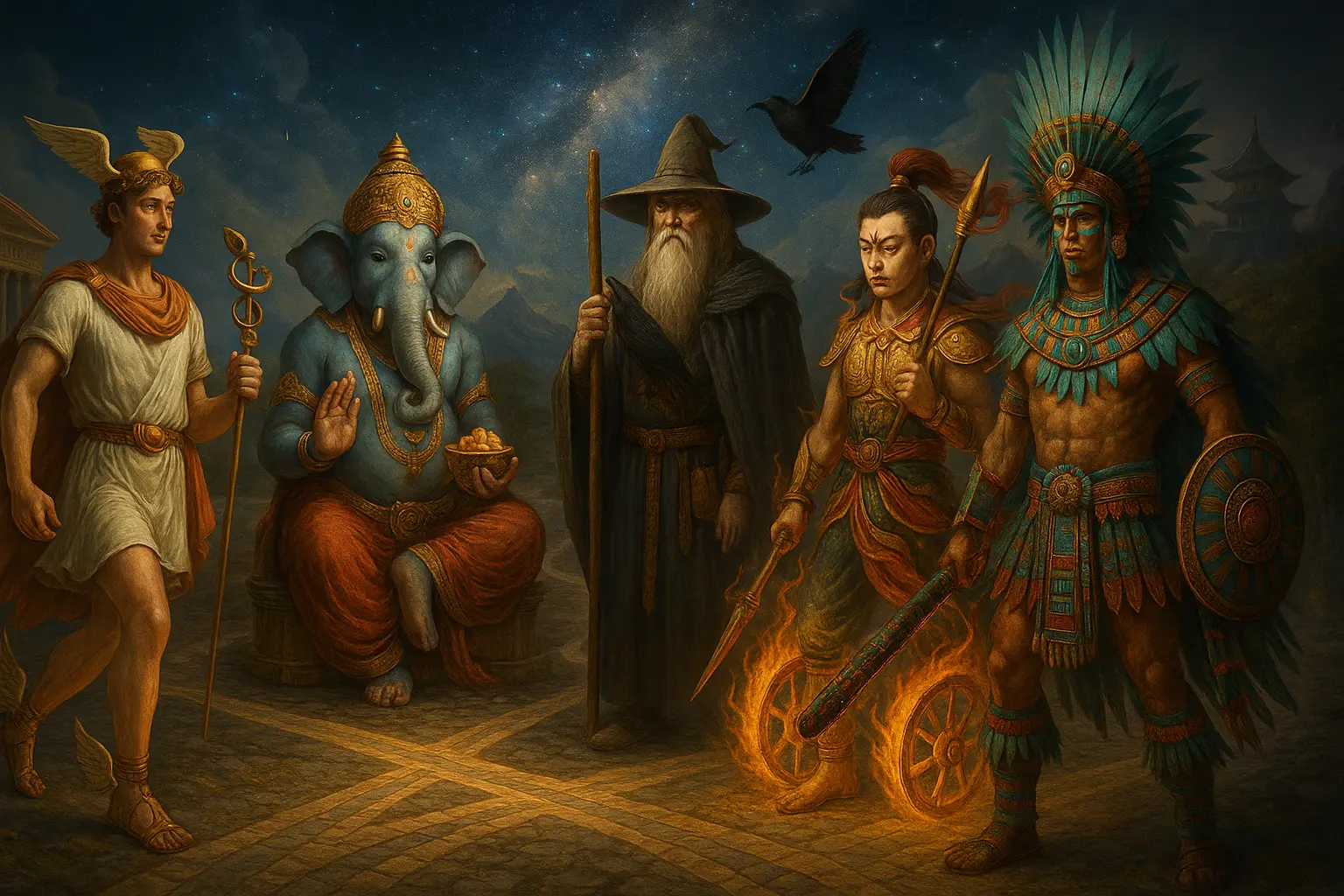Have you ever stood at the edge of something new, suitcase in hand, heart pounding with anticipation? That undeniable pull to move—to explore, to escape, to discover—has echoed across time. Long before boarding passes and mobile apps, people turned to divine forces for protection and guidance. The god of travel wasn’t just a figure of myth but a companion on every uncertain path, a symbol of both direction and destiny.
This isn’t just history. It’s your story too. Whether you’re traveling across continents or navigating life’s winding roads, ancient journey gods still whisper their wisdom. And today, you’ll rediscover them—your invisible guardians of movement, messengers of change, and timeless symbols of the road ahead.

Table of Contents
Who Is the God of Travel? Understanding Divine Guides of the Journey
What Defines a God of Travel?
In ancient cultures, gods and goddesses weren’t just passive icons—they were real forces. A travel god wasn’t limited to physical movement. They guided souls, opened roads, and protected pilgrims, messengers, warriors, and wanderers alike.
Travel deities emerged wherever people moved. Roads were uncertain, voyages were perilous, and divine help was a necessity. These gods became essential companions for every departure and return.
Common Traits Across Civilizations
Though scattered across cultures, travel deities share recurring symbols and roles:
- Symbols: Wings, staffs, sandals, animals like snakes or horses
- Attributes: Speed, communication, boundary-crossing, guidance
- Domains: Roads, skies, thresholds, dreams, souls in transit
They stood at thresholds—between worlds, decisions, and destinies.
Why People Prayed Before a Journey
In a world without maps or guarantees, travelers performed rituals before departing:
- Burnt incense at crossroads
- Whispered prayers at altars
- Offered coins to roadside shrines
These acts weren’t superstition—they were survival. They acknowledged the unseen forces that influenced the journey.
Gods of Travel Across Cultures: A Global Exploration
You’re about to step into the pantheon of travel guardians from every corner of the globe. These aren’t just dusty names—they’re dynamic forces with lessons still relevant today.
Hermes – The Greek God of Travel and Messengers
Hermes is the archetype. Winged sandals, fluid speech, and cunning movement define him. He’s the god of:
- Travelers and merchants
- Messengers and thieves
- Boundaries and transitions
Known for his caduceus (a serpent-entwined staff), Hermes guides not only physical travelers but also souls crossing into the afterlife. He’s speed, strategy, and style in motion.
Mercury – The Roman Echo of Hermes
Mercury mirrors Hermes but aligns more with commerce and communication. Romans invoked Mercury before trade missions or diplomatic journeys.
- Patron of merchants
- Protector of financial ventures
- Swift mediator between gods and mortals
Where Hermes danced between realms, Mercury made deals and opened markets.
Odin – The Norse Wanderer God
Odin isn’t your typical traveler—but his journeys are legendary. He roams the nine worlds in search of wisdom, knowledge, and runes.
- One-eyed seer of fate
- Rides Sleipnir, an eight-legged horse
- Symbol of sacrifice and deep learning
If Hermes is the road runner, Odin is the sage on the lonely path. He speaks to those who travel not for pleasure, but for transformation.
Ganesh – The Hindu Remover of Obstacles
Before any Indian journey, you’ll likely hear his name: Ganapati Bappa Morya! Ganesh, the elephant-headed god, is your first stop:
- God of beginnings
- Remover of travel hindrances
- Guardian of roadways and spiritual thresholds
Offer a sweet modak to him, and you begin your path blessed.
Huitzilopochtli – Aztec God of War and Migration
Unlike others, Huitzilopochtli was a god of movement with purpose. He led the Mexica (later Aztecs) on a divine migration to their destined homeland.
- God of sun and warriors
- Led an entire civilization’s sacred journey
- Associated with hummingbirds (symbol of tireless travel)
This is travel as destiny—not vacation.
Nezha – Chinese Youthful Deity of Motion
A rebellious protector of the roads, Nezha is a Taoist figure beloved by modern travelers.
- Rides fiery wheels
- Defends against evil spirits
- Invoked for safe transit, especially by drivers
Modern Chinese travelers still place talismans of Nezha in cars, trains, and boats.
Sacred Journeys: Pilgrimage and the Spiritual Meaning of Travel
You may think travel today is secular. But in its deepest sense, it’s always been sacred.
Why Pilgrimages Matter
Pilgrimage is a journey with meaning. Unlike a vacation, it demands something from you. It changes you.
Famous Pilgrimages:
- Camino de Santiago (Spain)
- Hajj to Mecca (Islam)
- Mount Kailash (Hindu, Buddhist, Jain)
Each of these paths invokes a divine connection, echoing the ancient call: Move your feet, and your soul will follow.
Travel as a Metaphor for Life
Every step away from home is symbolic. Travel gods embody this truth:
- The road mirrors your inner transformation
- Challenges reveal your spiritual readiness
- Return is never to the same place—it’s to a new you
Modern Echoes of Ancient Travel Gods in Today’s Culture
Though the temples may have crumbled, their presence lingers in your world.
Superstitions That Survive
From flight delays to packing rituals, travel still feels precarious. And you might be following ancient habits without realizing it:
- Carrying charms (Hermes’ talismans)
- Avoiding unlucky numbers (cross-cultural protection)
- Whispering prayers before departure (rituals of Ganesh or Nezha)
Even your travel anxiety? That’s your body remembering how vulnerable movement once was.
Gods in Pop Culture
Travel deities still walk your screens and pages:
- Hermes/Mercury in Percy Jackson, God of War, Marvel comics
- Nezha in animated films (Nezha: Birth of the Demon Child)
- Odin in Vikings, Thor franchise, and Norse-inspired video games
These figures haven’t faded. They’ve evolved.
How You Still Seek Guidance
You follow reviews, influencers, GPS, and checklists. Yet still, there’s a moment before a big trip where you hope—for smooth flights, kind strangers, no missteps.
That moment is your personal prayer to the god of travel.
Sacred Offerings and Ritual Foods for Journey Blessings
Before setting out, many cultures prepare foods not just for energy—but for blessing.
Table: Ritual Foods for Travel Blessings
| Culture | Deity | Offering/Food | Symbolism |
|---|---|---|---|
| Ancient Greece | Hermes | Wine, honey, olives | Sweetness, safe communication |
| Hindu | Ganesh | Modak (sweet dumpling) | Prosperity and smooth beginnings |
| Aztec | Huitzilopochtli | Tamales with amaranth | Warrior strength, divine purpose |
| Chinese Taoist | Nezha | Long noodles, green tea | Longevity, peaceful road ahead |
| Norse | Odin | Mead, roasted meat | Strength, wisdom for journeying |
How to Incorporate These Today
- Carry a symbolic snack (e.g., sweet or salted food)
- Cook a travel-blessing meal before your next trip
- Share food at the start of a group journey
These acts ground your trip in meaning.
Lessons from the Gods of Travel: What They Teach You Today
You’re not just learning mythology—you’re gaining companions.
Embrace Uncertainty
Hermes doesn’t promise smooth roads—he teaches you to move anyway. So should you.
- Let go of needing to control every step
- Embrace spontaneity
- See detours as divine redirections
Respect the Journey
Odin walked willingly into trials. Travel is a sacred process of change. Honor it.
- Reflect before and after your trips
- Journal your experiences
- Treat the journey itself as the destination
Prepare Spiritually
Ganesh teaches you to prepare with purpose.
- Set an intention
- Bless your backpack or car
- Start with gratitude and clarity
These acts don’t require belief in any god—just belief in the journey’s power.
Conclusion:
You’re not just moving through space—you’re moving through meaning. The god of travel, in every culture and form, speaks to that part of you that’s always in motion.
Next time you step into a taxi, climb a mountain, or open a travel app—pause. Remember Hermes’ wings, Ganesh’s blessings, Odin’s vision. The gods don’t ask for temples. Just your awareness.
Because every trip you take is sacred.
FAQ : God of Travel
Who is considered the main god of travel?
Hermes, from Greek mythology, is the most recognized travel deity. He’s fast, clever, and a guide across all boundaries—physical and spiritual.
Are there female gods of travel?
Yes. While less commonly known, goddesses like Iris (Greek) and Rhiannon (Celtic) play roles in communication, movement, and mystical travel.
How can I honor a travel god today?
Light a candle, carry a symbol (wing, key, coin), or simply whisper a travel blessing. It’s not about religion—it’s about mindfulness.
Can I mix traditions when seeking travel blessings?
Many modern travelers blend traditions respectfully. Just take time to learn the meaning behind each one.








Leave a Reply